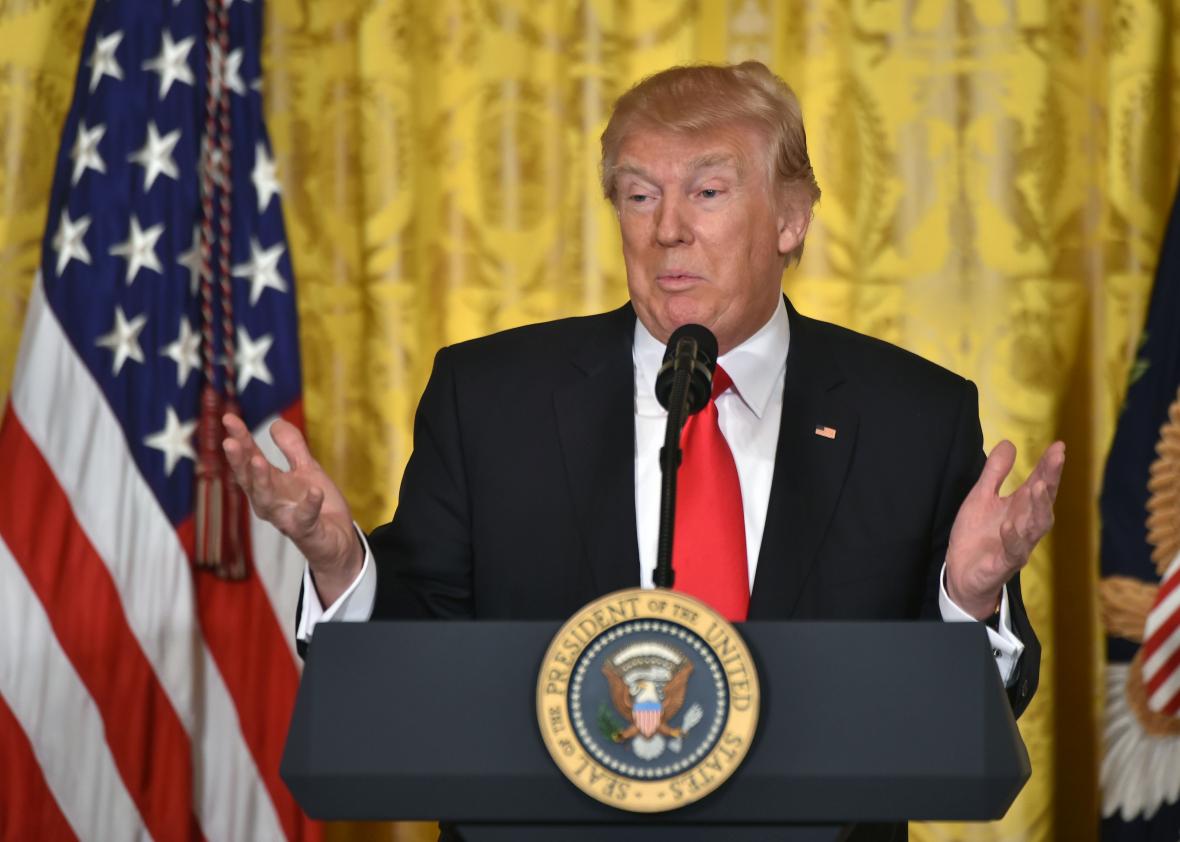
Some political experts doubted that Donald J. Trump would tough it out this long. This, after all, was a very strange man, possibly afflicted by obsessive-compulsive disorder to the point that he even floated the idea of staying in New York.
He moved to Washington. But Trump’s dangerous old compulsions remain: Twitter diarrhea. Impulsiveness. Recklessness. He insults adversaries whose cooperation he needs. He’s allergic to compromise. Will these character defects destroy him politically in 2018?
The odds of Trump remaining president by the end of next year, I said recently, were significantly less than 50%. I still think that’s true. But as noted above, we have a tendency to underestimate this highly inestimable man. The will-Trump-survive question is an equation with many variables.
One thing is clear: “The Resistance,” as the left-center political forces aligned against Trump and the Republicans grandiosely call themselves, is a null force. If Trump is forced out of office, it won’t have much to do with these Hillary Clinton supporters. The Resistance’s street activism peaked out with the Women’s March on January 21, 2017. They are, in Trumpspeak, Losers.
Russiagate, the allegation that Putin’s government “hacked the election” for Trump, still hasn’t risen above the level of a 9/11 Truther conspiracy theory — not one iota of actual evidence has appeared in the media. (Sorry, so-called journalists, “a source in the intelligence community believes that” is not evidence, much less proof.)
But Russiagate led to the appointment of special counsel Robert Mueller. Mueller’s sweeping powers and authority to pursue any wrongdoing he finds regardless of whether or not it’s related to Russian interference with the 2016 presidential election has already led to the downfall and flipping of ex-Trump national security advisor Michael Flynn.
Mueller’s pet rats may never turn up a smoking-gun connection between Vladimir Putin and Donald Trump. But they likely know where Trump’s bodies are buried. In addition to obstruction of justice — to which Trump de facto pled guilty in one of his insipid tweets — charges related to sleazy business dealings are a strong possibility. Was/is Trump in deep with Russian oligarchs and corrupt government officials? Perhaps not — but he’s an amoral real estate developer who follows money wherever it leads, including authoritarian regimes where transparency is nonexistent.
Behind every great fortune, Balzac wrote, there is a crime. Trump’s cash hoard probably results from many more than a single illegal act.
Impeachment or resignation? Having researched Trump for my 2016 biography, Trump is more likely to give away his fortune to charity than slink away in a Nixonian resignation. His ego is too big; he’s too pugnacious. He’d rather get dragged out kicking and screaming — unless it’s part of a deal with Mueller or other feds to avoid prosecution.
So impeachment it would need to be.
But no political party in control of both houses of Congress has ever impeached a sitting president of its own party. And there’s another powerful countervailing force protecting Trump from impeachment: Republicans’ self-preservation instinct.
GOP lawmakers suffered devastating losses in the 1974 midterm election following Nixon’s near-impeachment/resignation. Democrats did OK in 1998, after Bill Clinton was impeached — but that was an outlier impacted by the biggest boom economy ever.
In the long term, the Republican Party would probably be better off without Trump. But Congressmen and Senators live in the here and now. Here and now, or more precisely in 2018, Republicans know that many of them would lose their jobs following a Trump impeachment.
Despite those considerations, I think that, in the end, House Speaker Paul Ryan, Senate Majority Leader Mitch McConnell and other top Republicans are more likely to calculate that pulling the impeachment trigger is worth the likely losses in the fall.
Reason #1 is personal: Paul Ryan’s presidential ambitions. As I speculated in February, I believe Ryan wants to be president in 2020. As Speaker of the House, he’s the one person who can launch impeachment proceedings. I can easily imagine the following quid pro quo: Ryan gets rid of Trump, Pence agrees not to run in 2020, Ryan runs with Pence’s endorsement. Reason #2 is meta: to save the Republican Party as Ryan and McConnell know it. Here’s what I said in February: “Becoming the party of impeachment at a time when impeachment is popular transforms crisis into opportunity, allowing Republicans to cleanse their Trump-era sins (trying to repeal the increasingly well-received Obamacare, paying for the Great Wall of Mexico with deficit spending, etc.) and seize the moral high ground in one swoop. Vice President Mike Pence takes the helm, steadies the ship, promotes their right-wing agenda with more grace than his former boss, and Ryan and his buddies prepare for 2020.”
If anything, the GOP is in bigger trouble now.
Trump’s approval ratings hover between 35% and 40%. More worrisome for him and the Republicans, his support is shaky while those who hate him are firmly entrenched in their beliefs.
Approval of the Republican Party has hit 29%, the lowest ever recorded.
After failing to repeal Obamacare, the Republicans finally scored their first legislative victory last week when the Senate passed a sweeping series of tax cuts — but it’s wildly unpopular (52% against, 25% for). Pyrrhic much?
GOP elders were already fretting that Trump was ruining the GOP brand following the alt-right riots in Charlottesville. What they’re about to realize (if they haven’t already) is that the president has also undermined one of the party’s strongest longstanding arguments: “The government should be run like a great American company,” as Jared Kushner said in March. “Our hope is that we can achieve successes and efficiencies for our customers, who are the citizens.”
Voters have watched Trump’s staff churn through one resignation and shakeup after another, the president diss his own sitting cabinet members, with no sign of his campaign’s stated goals being talked about, much less executed. The Trump Administration has been characterized by communication breakdowns, chaos, mismanagement and waste — and has little to show for its efforts.
This is the current face of the Republican Party: corrupt, stupid and inept. Ryan and McConnell know they must disassociate the GOP from Trump.
They have to destroy their party in order to save it.
(Ted Rall (Twitter: @tedrall) is co-author, with Harmon Leon, of “Meet the Deplorables: Infiltrating Trump America,” an inside look at the American far right, out December 12th. You can support Ted’s hard-hitting political cartoons and columns and see his work first by sponsoring his work on Patreon.)







